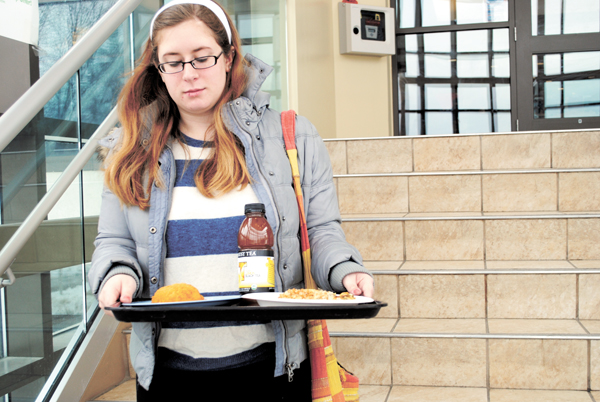
Those who enjoy the convenience of a dining hall tray may no longer have that option, as Binghamton University’s Student Assembly is considering the idea that they may no longer be a necessary part of the dining hall experience.
A student, a resident assistant in Newing College, sponsored the legislation in the Student Association Assembly, claiming that students do not have an inherent need for trays.
“Binghamton is a nationally recognized green campus. However, we are really wasteful with trays,” the student said. “Without trays, students are less likely to eat an overabundance of food and are more cautious toward what they buy. Inevitably, this saves students a ton of money over the course of the year. It promotes an eco-friendly, financially responsible and healthy dining hall environment for students.”
In her resolution, the student estimates that “the elimination of trays could save up to 5,500 gallons [of water] per day,” citing Sodexo figures and an estimate of the amount of water needed to rinse a dining hall tray.
The resolution also argues that the use of trays can contribute to an over-consumption or unnecessary taking of food that could lead to unhealthy habits or food waste.
But according to Robert Griffin, district marketing manager for Sodexo, this change in dining hall procedure does not appear necessary at this point in time.
“We see less food wasted at Binghamton already, just because of the style,” Griffin said, referring to BU’s à la carte system of dining, as opposed to an all-you-can-eat dining style.
Peter Napolitano, director of auxiliary services at BU, also said he thought the waste at BU was already minimal.
“Students are going to buy only the food that they take, so they are not going to waste anything,” Napolitano said. “Most of the industry that have gone tray-less have what you call an ‘all-you-can-eat’ meal plan and our campus does not have that kind of plan at all, so our waste is very minimized.”
Some students feel this proposal would have a detrimental effect on their dining hall experience, given the current state of the dining hall operations.
“As far as reducing peoples’ food consumption because they’re not using trays should be up to the people, whether or not they have enough food or they want more,” said Brandon Dukoff, a junior majoring in biochemistry.
Since BU is a self-described eco-friendly campus, some question whether the amount of water being used to wash the trays affects this title.
“Now the only savings … this is such a minimal amount, if anything, if at all, could be the fact that we’re not washing trays in our dishwasher,” Napolitano said. “The fact of the matter is we’re going to have the dishwashers … sanitize and clean our dishes, whether it be a plate, a fork, a knife, a spoon, a glass or anything, we’re going to have water running anyway. To break it out to save water is a very minuscule amount.”
Some think that the trays may not affect student health concerns because students are already conscious of their health.
“I have never seen more health-conscious students in here and I have been here almost seven years,” said Debbie Love, a Sodexo cashier. “They are becoming more and more health conscious.”
Editor’s Note (3/8/24): This article has been updated to remove a name of a student.


